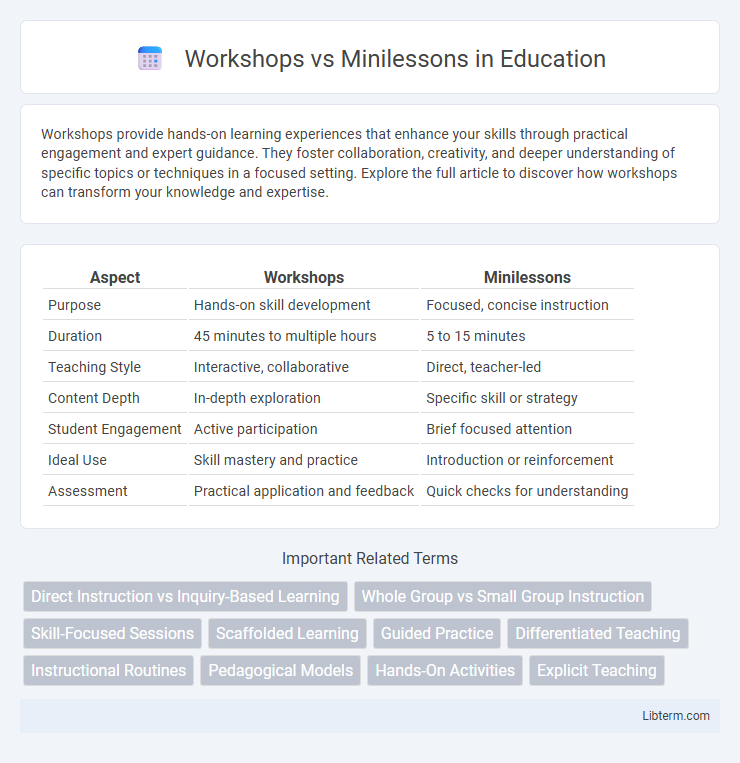Workshops provide hands-on learning experiences that enhance your skills through practical engagement and expert guidance. They foster collaboration, creativity, and deeper understanding of specific topics or techniques in a focused setting. Explore the full article to discover how workshops can transform your knowledge and expertise.
Table of Comparison
| Aspect | Workshops | Minilessons |
|---|---|---|
| Purpose | Hands-on skill development | Focused, concise instruction |
| Duration | 45 minutes to multiple hours | 5 to 15 minutes |
| Teaching Style | Interactive, collaborative | Direct, teacher-led |
| Content Depth | In-depth exploration | Specific skill or strategy |
| Student Engagement | Active participation | Brief focused attention |
| Ideal Use | Skill mastery and practice | Introduction or reinforcement |
| Assessment | Practical application and feedback | Quick checks for understanding |
Introduction to Workshops and Minilessons
Workshops provide an immersive, hands-on learning experience where participants engage deeply with skills over extended sessions, fostering collaboration and practice. Minilessons, typically brief and targeted, focus on introducing specific concepts or techniques succinctly within a larger instructional framework. Understanding the distinct purposes of workshops and minilessons helps educators structure effective learning environments that balance in-depth exploration with focused instruction.
Defining Workshops in Education
Workshops in education are structured, interactive sessions focused on in-depth exploration of a specific skill or concept, promoting active student participation and hands-on learning. Unlike minilessons that provide brief, targeted instruction, workshops engage learners through collaborative activities, critical thinking, and application of knowledge over an extended period. This pedagogical approach supports deeper understanding and retention by involving students in meaningful practice and reflection.
What Are Minilessons?
Minilessons are brief, targeted instructional sessions designed to teach a specific skill or concept in a focused and efficient manner, typically lasting 10 to 15 minutes. They emphasize direct teaching with clear objectives, modeling, and guided practice to ensure students quickly grasp and apply new knowledge. Unlike workshops, which are longer and more exploratory, minilessons streamline learning by concentrating on one central idea or strategy at a time.
Key Differences Between Workshops and Minilessons
Workshops provide extended, hands-on learning experiences allowing students to explore topics in depth, while minilessons deliver concise, focused instruction on a specific skill or concept in typically 10-15 minutes. Workshops emphasize student collaboration and active participation, promoting application and synthesis of knowledge, whereas minilessons prioritize direct teacher modeling and guided practice for rapid skill acquisition. The key difference lies in duration and scope: workshops foster comprehensive, student-driven exploration; minilessons offer targeted, teacher-led instruction.
Benefits of Workshop-Based Learning
Workshop-based learning promotes active engagement and hands-on experience, enhancing skill retention and critical thinking. It fosters collaborative learning environments where participants exchange diverse perspectives and solve real-world problems together. This approach also adapts to individual learning paces, supporting deeper understanding through iterative practice and immediate feedback.
Advantages of Minilesson Strategies
Minilesson strategies offer targeted, concise instruction that enhances student engagement and retention by focusing on specific skills or concepts within a brief timeframe. These focused sessions allow teachers to address immediate learning needs and differentiate instruction effectively, promoting a responsive and adaptable classroom environment. The brevity and clarity of minilessons support efficient use of instructional time, enabling more opportunities for guided practice and independent learning.
When to Use Workshops vs Minilessons
Workshops are ideal for active learning environments requiring hands-on practice, collaboration, and in-depth exploration of complex topics. Minilessons work best for concise, targeted instruction aimed at introducing or reinforcing specific skills or concepts in a short time frame. Choosing workshops suits project-based learning or extended skill development, while minilessons effectively address immediate learning needs or quick skill boosts.
Blending Workshops and Minilessons Effectively
Blending workshops and minilessons effectively enhances student learning by combining the immersive, hands-on engagement of workshops with the focused, targeted instruction provided by minilessons. Workshops allow students to apply strategies in authentic contexts, while minilessons deliver concise, skill-specific guidance that addresses immediate learning needs. Integrating formative assessment during workshops informs subsequent minilessons, creating a dynamic, responsive teaching approach that maximizes literacy development and student autonomy.
Common Challenges and Solutions
Workshops and minilessons often face challenges such as limited student engagement and time constraints that hinder deep learning. Tailoring activities to student interests and incorporating interactive elements can boost participation and retention. Implementing focused objectives and flexible pacing addresses time management issues, ensuring effective knowledge transfer.
Conclusion: Choosing the Right Approach for Student Success
Workshops provide immersive, hands-on experiences that foster deep skill development and collaboration, while minilessons deliver focused, targeted instruction ideal for introducing or reinforcing specific concepts. The optimal choice depends on student needs, learning objectives, and available time, with a balanced combination often maximizing engagement and retention. Educators should assess context to implement workshops for comprehensive learning and minilessons for concise, targeted skill-building, ensuring tailored support for student success.
Workshops Infographic

 libterm.com
libterm.com